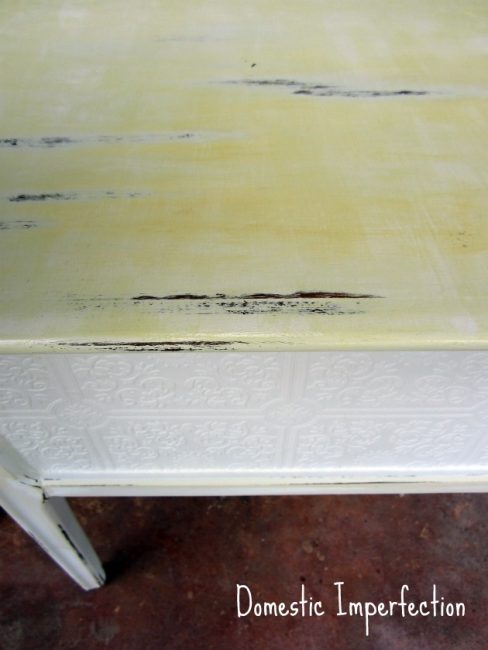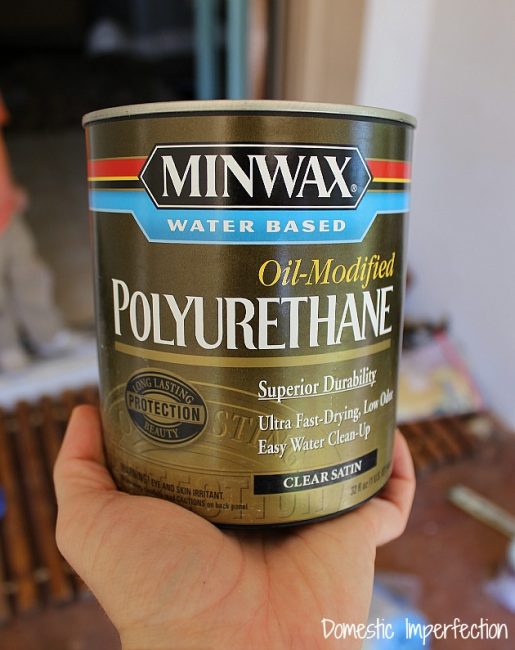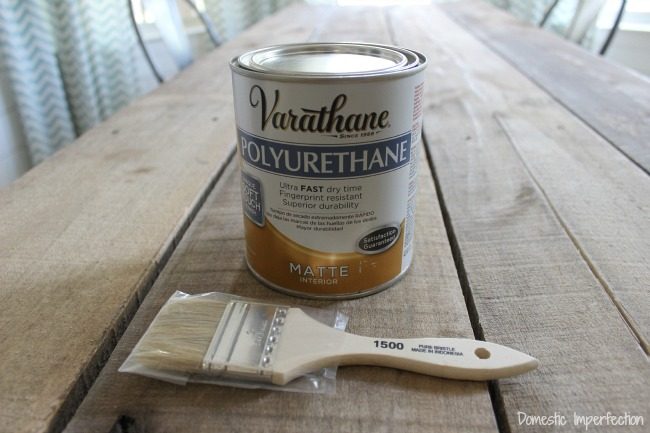Can You Use Two Different Sealers on the Sme Art Work

Imagine you spend forever sanding, priming, and painting a beautiful piece of furniture you lot found at a garage sale. It looks fantastic…you breathed new life into information technology similar a freaking pro. Become you! The last pace is to protect the paint and then it looks this amazing forever. Y'all grab a sealer from the hardware store without much thought…considering sealer is sealer, right? Except it's non, and your entire projection turns yellow and streaky, completely ruining information technology.

Every bit you tin can see in the to a higher place photo, this has happened to me…multiple times. It sucks, and I don't want the same thing to happen to you lot. So let'southward accept a fun piffling conversation about a very irksome subject…water-based vs oil-based sealers.
No matter how many disruptive names they requite sealers, for the purposes of this postal service they boil down to 2 categories – Oil-based sealers and water-based sealers. Hither are a few facts about each type –
Oil-based sealers
- Offers bully protection
- Strong odor
- Has an amber tint
- Has a long cure time (24 hours or more than before recoat)
- Less expensive than water-based poly
- Thicker and requires fewer coats than a water-based sealer
- Must be cleaned upwards with mineral spirits
- Will xanthous over time (and will ruin painted projects)
- Gives wood a deeper, richer colour
Water-based sealers
- Offers peachy protection (some say less than oil-based, but I haven't found that to be true)
- Looks milky in the can, goes on completely articulate
- Shorter cure fourth dimension (4-hour recoat or less)
- More than expensive than oil-based poly
- Tin be cleaned upwards with h2o
- Stays articulate over the years
- Tin look dull on woods pieces
This gets fifty-fifty more confusing because they now mix and match names – I one time bought and used a tin labeled "h2o-based oil-modified polyurethane" I hateful….what the hell does that fifty-fifty mean?

I used it and can tell you lot exactly what it means…it means information technology volition plough yellow and ruin your entire painted project. If the tin says oil on it, no thing how much it also says the word water elsewhere on the can… it volition yellowish over fourth dimension.
Which sealer should I choose?
I choose to use a water-based sealer on most 95% of my projects.
There are endless things out there that demand sealer, but for this post nosotros are talking well-nigh small household DIY projects…article of furniture, cabinets, doors, etc. For these types of projects, I choose a water-based sealer 95% of the time. Why? Information technology'south uncomplicated to utilise (easy cleanup, quick dry time), offers fantastic protection, and DOESN'T Yellowish. Not yellowing is the kicker here. If the matter you are sealing is painted, so you absolutely demand to be using a water-based sealer. I am telling yous from experience that if y'all apply an oil-based sealer over paint it volition expect horriblein about a week. The finish will plow xanthous and streaky and you will be forced to redo your entire projection.
In that location are a few instances where I volition choose an oil-based sealer. If the projection is wooden, sometimes an oil-based sealer is a better option because it gives the forest depth and color than water-based can't provide. If you are sealing a wood that usually looks corking with an orangy/amber tint, choose an oil-based sealer…water-based may brand your project look dull and lifeless. If your wood project is whitewashed, a gray shade, rustic barn wood, or a shallow low-cal wood similar maple, go water-based.

My electric current favorite is made past Varathane, it's a is a h2o-based sealer that has never failed me. Plus it'south inexpensive. It comes in all different sheens, satin is probably the most popular. I personally am a large fan of the matte because I don't like my finishes to me shiny at all, and this is a great i.
Anyway, that is a very simplified answer to the oil vs. water debate, only hopefully you institute it helpful! If yous have whatever specific questions please enquire in the comments, I have spent an embarrassing amount of time experimenting with sellers over the years and I would love to put that knowledge to good utilise!
You lot may likewise like –
My butcher block countertops, two years after (which sealer to use??)
Experimenting with sealers for my newspaper pocketbook floors
The ultimate guide to painting cabinets
DIY physical countertops part Three – sealing
DIY epoxy garage floor
Source: https://wildfireinteriors.com/oil-based-vs-water-based-sealer/
0 Response to "Can You Use Two Different Sealers on the Sme Art Work"
Postar um comentário